
- How we helpServicesThe Congregational Resource Guide
The CRG (Congregational Resource Guide) is an online tool designed to help leaders of all congregations find the right resources to address their unique challenges and needs.
Visit The CRG- Resources & Events
- Stories
Share your storyLifting up stories from across the state is critical to building connections, forging a stronger congregational community, and helping others grow. Has Center for Congregations helped you navigate a challenge or opportunity? Please share your story with us.
Submit a Story- About
Our MissionThe Center for Congregations strengthens Indiana congregations by helping them find and use the best resources to address their challenges and opportunities.
About UsThe Center for Congregations strengthens Indiana congregations by helping them find and use the best resources to address their challenges and opportunities.Contact UsCenter for Congregations
303 North Alabama Street, Suite 100
Indianapolis, IN 46204Transforming Lives, One Heart Tug at a Time: A Congregation’s Outreach from Seymour to Maui
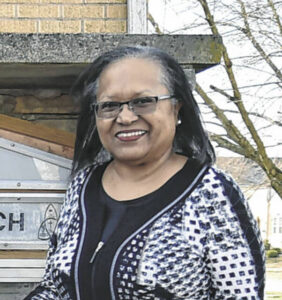
Pastor Sondra Gentry, Bethel Community Church
Nestled in Seymour, Indiana, Bethel Community Church stands as a shining example of the timeless principle: “Love thy neighbor.” With a congregation of just 25 individuals, Bethel Community embodies the transformative power of compassion in action.
In 2020, with the support of a Center for Congregations Community Ministry Grant, the church pioneered a traveling homeless shelter, extending a lifeline of hope and support tothose in need throughout Seymour. Fast forward to 2024, Bethel Community continues to serve as a testament to the profound impact that can be achieved when love guides our actions.
From humble beginnings in Seymour, their mission has gone national, demonstrating the extraordinary potential of a community united by a shared commitment to loving and caring for one another. Pastor Sondra Gentry of Bethel Community shares their inspiring story in this month’s guest blog.
—–
The Humble Beginnings of a Loving Opportunity
The discovery of a loving opportunity often begins with a heart tug: a pull on one’s emotions, mind, spirit, and social situation that refuses to cease without a response. I suspect God designed us all with this capacity to act in loving ways for others. That is how “Cold Night Out,” the traveling homeless shelter in our community began. That is how our response to homelessness evolved beyond Seymour, Indiana.
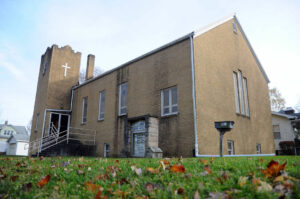
Bethel Community Church in Seymour
The shelter began as a solution to the shock of a person in our community dying from exposure to cold weather while living in a car. An ensuing needs assessment included meetings with local church and community leaders, door to door conversations, listening to comments of people experiencing homeless lifestyles, site visits to three effective models of shelters in other cities and states, followed by two community assessments midway through the project.
Who we are and whose we are, has to be the originating reigning factor in designing a response to a heart tug. While the immediate need for safe places to sleep and eat was paramount, that would not be enough to move people from homelessness to self sufficiency. The solution called for mission rather than evangelism. Mission is an attempt to learn the behavior, history, language, culture, and thoughts of another group, which is necessary in order to be effective cultural crossers. Homelessness has its own culture. Those who experience homelessness survive by adapting to the culture of their situation. Church is also a culture. So, we decided to be guided by successful church models visited in the assessment phase. Hence, the traveling shelter, Cold Night Out.
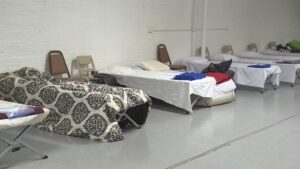
Cold Night Out Shelter
Local churches in our community rallied together, volunteering on rotation to provide meals and night shelter for one week at a time. As shelter guests gained night employment, two churches in our community volunteered to serve as day shelter sites. This ecumenical base of church volunteers continuously expanded. Volunteers are our most important resource. We wanted to meet our goal of ensuring their service would be as rewarding to them as it was to those being served. Training for volunteers and coordinators included teachings on mental health, educational opportunities, family systems, assessment, case management, available resources, and safe serving. Training videos for volunteers and client intake were developed to accommodate the constant flow of new volunteers.
The Traveling Homeless Shelter Goes National
As the city of Seymour moved to provision of a shelter building, churches were no longer needed as sites. However, Cold Night Out continues to provide Sunday meals, gas, referrals, and emergency housing when the stationary site is unavailable. But heart tugs do not vanish – they expand. Cold Night Out gave all of its supplies and equipment to the people of Kentucky in response to their tornado crisis. Then, another heart tug arrived with the Lahaina, Maui fire. A community of churches, known as the Unity Group, and Cold Night Out purchased supplies requested by the Maui population.
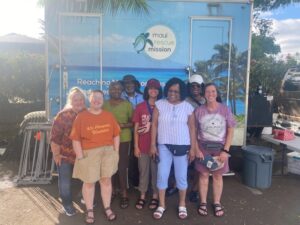
The Bethel Community team in Maui
Using the model and guiding philosophy of the traveling shelter, a team assembled to serve in Maui. Classes added to volunteer training were Grief and Crisis Intervention in Natural Disasters, Soul Wounding-The Impact of History and Culture Upon Grief, Grief Models, and Hawaiian History and Culture. These classes were taught by local Hawaiian community leaders and pastors.
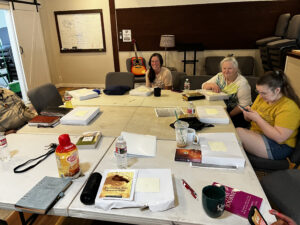
Volunteer training session in Maui
The traveling shelter team embedded with a local Maui community agency to help provide housing, direction to local individual mission encounters, and connection with local partner sites serving homeless populations.
The team was effective, friendly, and caring. We spent time talking with those experiencing homelessness, listening to the things that interested them. They said it encouraged them to see people from the mainland helping. The face-to-face and hand-to-hand connection seemed more important to them than money.
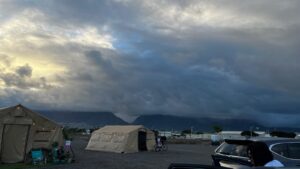
Traveling shelter setups in Maui
Everywhere we went people were encouraged by our coming. They need to feel hopeful about the larger world’s concern for them. The gifts were great but it was our presence that mattered. A common theme among volunteers was feeling a heart tug to serve homeless persons in Maui. A favorite volunteer saying was, “God’s got this.” Heart tugs know no boundaries.
Related Stories
The Center for Congregations is funded by Lilly Endowment, Inc. and is a supporting organization of the Christian Theological Seminary in Indianapolis and Louisville Presbyterian Theological Seminary.
The Latest on the PodcastS6 E17 - The Power to Form and TransformPodcast Guest: Rev. Dr. Tim Shapiro and Dr. Christina Davis - Resources & Events

